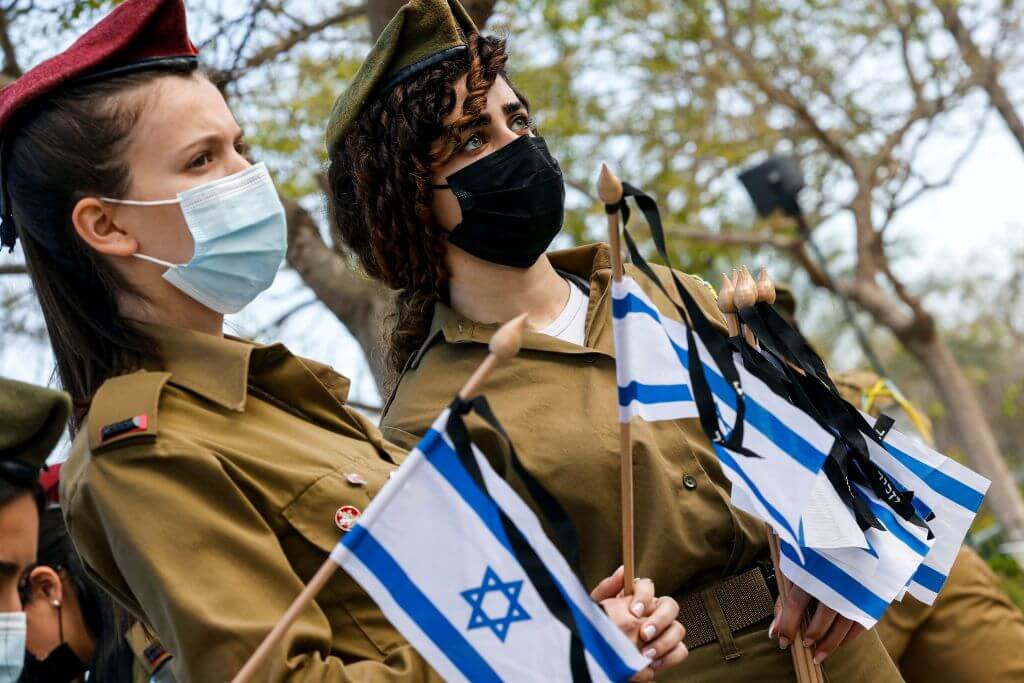Israeli soldier kills herself after reporting she was raped. Now army probes suspicions of negligence

Israeli soldiers during Memorial Day 2021. Photo by Getty Images
This article originally appeared on Haaretz, and was reprinted here with permission. Sign up here to get Haaretz’s free Daily Brief newsletter delivered to your inbox.
A female soldier reported to her officers that she had been raped. Her complaint was not passed on as required, nor did anyone from the army’s mental health services speak to her about it. Ten days after reporting her rape, and after one failed attempt, she killed herself at the base where she served, with her commander’s gun.
The Military Police are now questioning officers involved with the case on suspicion of neglect, as they failed to pass on the soldier’s complaint to the Israel Police or the Military Police, and did not provide her with appropriate treatment.
About 10 days before the soldier took her own life, she attended a Purim party off the base where she served. After the party, she informed her commanding officers that she was raped and in poor psychological condition. Despite her complaint, she was not taken to a hospital’s special trauma room for victims of sexual assault. Furthermore, no steps were taken to limit her access to a weapon, as should be done in such cases.
Although her commanding officers did report the rape to the army’s mental health authorities and to the chief of staff’s adviser on gender affairs, their representatives failed to meet with her.
The day before the soldier died, she was hospitalized after a failed suicide attempt. According to sources familiar with the case, while she was at the hospital a mental health officer phoned her and asked how she was doing, but did not follow through to make sure she has a safe environment waiting for her when she’s discharged. Her immediate family was not in Israel at the time, and it is unclear what they knew at this point.
She was released from the hospital without anyone from the army to accompany her and no army personnel attempted to contacted her. Her access to a weapon was not restricted, and she was allowed entry to army bases.
When the army was asked about this, representatives declined to say whether they knew why she was in the hospital. When the soldier returned to the base from the hospital, she went to the quarters of her direct superior, Lt. Col. Yaki Dolef. She took his weapon, left a personal letter, and shot herself once in the chest, dying instantly.
It was then decided to have an autopsy performed at the Tzrifin army base by coroners from the Abu Kabir Institute of Forensic Medicine. The army did not inform the coroners about details of the rape or her attempted suicide. According to medical personnel, the army sent a form with limited information, noting that the cause of death was under investigation. When medical personnel tried to obtain more details, the only relevant information came from the Health Ministry, which told them that the hospital had reported the soldier’s attempted suicide, after her death.
The army’s chief medical officer was informed; however, as of publication of this report, the army has refused to provide details of what was done with the information received, whether the army was aware of the soldier’s attempted suicide the day before she killed herself, and what was done to prevent her suicide. The postmortem revealed no signs of bruising that would indicate rape; however, the coroners said they could not rule out that the victim had been sexually assaulted 10 days before.
The Military Police are investigating army mental health personnel and senior officers in the chief of staff’s unit on gender affairs on suspicion of neglect and disregard of the distress the soldier reported, and on suspicion of not passing on the information, which could have prevented her death.
Investigators asked the soldier’s commanding officers to explain how they made their decisions and passed on information from the moment they found out about the assault. The army confirmed that the soldier reported the assault days before her suicide, and admitted that mental health officers had not met with her in person, making do with a brief phone call while she was in the hospital. The army refused to answer Haaretz’s questions about the actions of her commanders and conduct toward her in the days before her suicide, citing the ongoing nature of the Military Police investigation.
The IDF spokesman responded: “A female IDF soldier was found dead in her unit. The Military Police immediately launched an investigation of the circumstances. When the investigation concludes, the findings will be conveyed to the military prosecution. Due to privacy issues and the sensitivity of the information requested, and in light of the investigation underway, we cannot discuss the claims. The IDF sends its condolences to the family and will continue to accompany them.”
With regard to the soldier’s commanding officer, Lt. Col. Dolef, the IDF spokesman said: “Lt. Col. Dolef is a highly regarded officer, who served in a variety of core operational and command roles.”
In March 2020, during Dolef’s stint as commander of the Paratroops Brigade, Sgt. Evyatar Yosefi drowned during a training exercise, and Dolef was reprimanded. The Military Police investigation produced no findings that led to further steps.
The year prior, in 2019, also during Dolef’s time as commander of the Paratroops Brigade, a recruit, Ron Oved Eliyahu, who was trying out for the brigade, was killed when a bus parked on an incline rolled down onto the tents where recruits were sleeping. In keeping with a decision by the chief of staff, Dolef was reprimanded and his promotion was delayed for a year.
When the year was up, it was decided to appoint him commander of the Judea and Samaria Division the following year, in light of the high regard for his service record and considering the command decisions.

I hope you appreciated this article. Before you go, I’d like to ask you to please support the Forward’s award-winning, nonprofit journalism during this critical time.
Now more than ever, American Jews need independent news they can trust, with reporting driven by truth, not ideology. We serve you, not any ideological agenda.
At a time when other newsrooms are closing or cutting back, the Forward has removed its paywall and invested additional resources to report on the ground from Israel and around the U.S. on the impact of the war, rising antisemitism and the protests on college campuses.
Readers like you make it all possible. Support our work by becoming a Forward Member and connect with our journalism and your community.
Make a gift of any size and become a Forward member today. You’ll support our mission to tell the American Jewish story fully and fairly.
— Rachel Fishman Feddersen, Publisher and CEO
Join our mission to tell the Jewish story fully and fairly.























